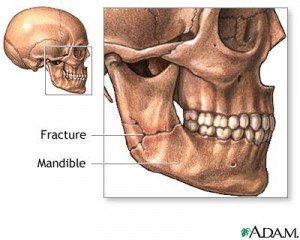A broken jaw is any break in the jaw bone. It is also known as a mandibular fracture. The jawbone, or mandible, is the largest and primary bone of the lower part of the face. . It is a fairly common facial injury often caused by direct blow to the face. Majority of cases of broken jaws occur in men between the ages 20-30. More than half of all broken jaws occur only in one side of the face. Broken jaws are also commonly associated with one or more injuries involving the head, neck, face, eyes and nose. Always seek medical attention in cases of broken jaws. These kinds of fractures usually require surgery for complete healing to occur.
Causes of a Broken Jaw
One of the most common causes of broken jaws is injury to the face, which commonly include:
- Physical assault,such as a punch to the jaw
- Motor vehicular accidents
- Industrial accidents
- Injury from contact sports
- Accidental falls (common in children), especially face-first falls
Signs and Symptoms of a Broken Jaw
It may be hard to tell whether a jaw is broken, especially for children. Children may not be able to describe their symptoms well, therefore, if there is history of trauma to the chin, watch out for the following signs and symptoms:
- Bleeding from the mouth
- Tenderness or pain in the jaw, which is worsened by biting or chewing
- Trouble opening the mouth widely
- Jaw stiffness
- Facial swelling and bruising
- Loose or knocked-out teeth
- Facial numbness, specifically the lower lip
- Abnormal appearance of the jaw or cheek
- In severe fractures, there is very limited movement of the jaw
Complications from a Broken Jaw
Several complications may arise from a broken jaw. Although some are temporary, some may also be long-term, especially if left untreated. Delay in treatment for mandibular fractures may also lead to any of the following complications:
- Bleeding
- Difficulty eating and talking (temporary)
- Blockage of airway
- Breathing blood or food into the lungs
- Problem aligning the teeth
- Jaw or facial infection
- Temporomandibular joint and muscle disorders (TMJ disorders)
First Aid Management for a Broken Jaw
First aid can be administered for broken jaws, however, they cannot be 
- To help limit swelling, cold compress should be applied. Frozen pack of vegetables may also be applied. But do not apply these directly to the skin.
- If there is bleeding, it is advised to keep a paper cup to catch the drool or so blood may be spit.
- The jaw may be temporarily bandaged to prevent it from moving and help reduce pain. Do not apply bandage if not trained to do so.
Disclaimer: This article is for information purposes only and not meant to substitute for medical advice or formal training. To learn how to manage broken jaws and other broken bones in the body, enrol in First Aid Training.
